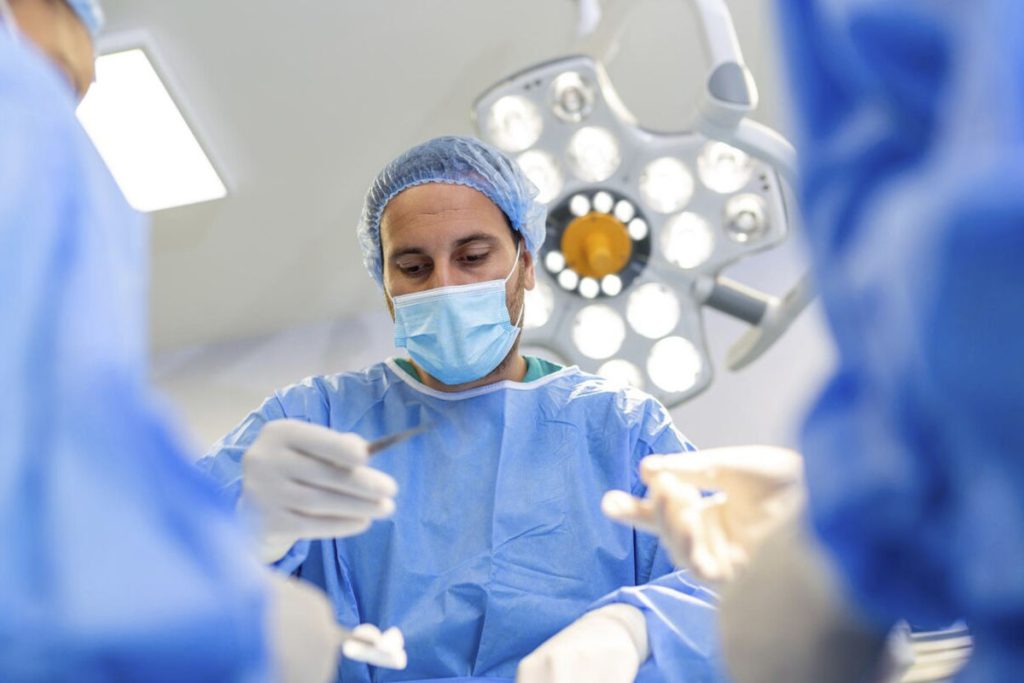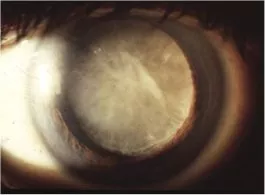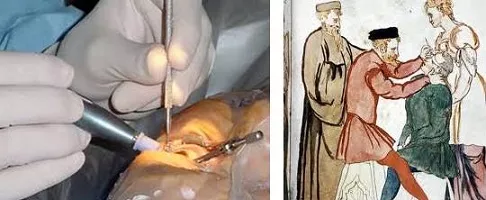
When should you have cataract surgery?
This is a very important question, which only you can answer. Just because you have a cataract (or lens opacity) does not mean that you need to have surgery. Everyone will develop lens opacities as they grow older. But not everyone needs an operation for it.
Your cataract will most likely be diagnosed by your ophthalmologist or optometrist using a special slit lamp microscope to examine the eye. It may be difficult to evaluate your lens and diagnose a cataract otherwise, unless it is very advanced, causing a white appearance of the pupil.

Cataract is best diagnosed via a slit lamp examination. It is only visible to the naked eye if it is very advanced, such as in the eye above where the pupil appears white instead of black.
Unlike eye diseases such as age-related macular degeneration and glaucoma, visual impairment from cataract can be restored following surgery. This means that you do not need to rush into the operating theater as soon as cataract is diagnosed. You should not feel pressured into having something done that you do not feel was required in the first place.
As a general guide, you should only go for a surgery if you are experiencing visual difficulties that are affecting your quality of life. Note that cataract alone does NOT cause pain unless associated with another eye condition. How your cataract affects your quality of life may differ from how it affects others. Examples include:
– Mistiness and haziness of vision
– Straining while reading and watching the television
– Glare while driving, especially at night or in bright daylight
– Difficulty with estimating depth, such as while pouring a cup of tea
– Focusing problems while playing sport

Modern cataract operations (left) are now very safe with excellent outcomes, and are a far cry from the ‘couching’ procedures performed during medieval times (right).
An operation therefore has the potential to significantly improve your quality of life. In fact, it has one of the best per quality of life improvement per unit cost indices of any medical or surgical procedure. Studies have shown cataract surgery to improve independence, reduce the risk of accidents and falls, and allow a return to driving.
In fact, it has one of the best per quality of life improvement per unit cost indices of any medical or surgical procedure. Studies have shown surgery to improve independence, reduce the risk of accidents and falls, and allow a return to driving.
An untreated lens opacity does not have any direct adverse effect on your eye or general health, except in special circumstances (examples below).
Why not perform surgery earlier?
There is no right or wrong time to have cataract surgery. The most important is that you undergo surgery when you are ready and feel the need for it.
The main reason for not doing surgery at the drop of the hat is because there is a small chance that you may run into complications during surgery. There is also a small risk of complications occuring early and even late after successful cataract extraction. Despite the advances in technology and skills, risks of complications associated with surgery have not been completely eliminated. The risk of blindness is around 0.1%. This means that there is a one in a thousand chance that you may go blind from cataract surgery. So while extremely rare, you could potentially end up with much worse vision than you started off with.
There are several circumstances where earlier removal of the cataract may be advantageous. Cataracts which are already very advanced may be more difficult to operate on if left alone for too long. Similarly, those with more severe health problems may prefer earlier surgery while they feel they are able to cope with an operation.
Early surgery may also be beneficial for those who have, or are at risk of, angle closure glaucoma. There is also a group of people who want to undergo early cataract surgery to correct their myopia or hyperopia. Another circumstance may be when the lens opacities are obscuring the view for effective retinal laser treatment for diabetic retinopathy
At the end of the day, you will have to weigh up whether your vision problems are bad enough for you to want to take the plunge and face any risks that surgery may bring. These risks are uncommon, and even if complications occur, most can be treated although some can be potentially disastrous. Do remember that many millions of people worldwide are enjoying good vision without any problems following their cataract surgery – and you could be one of them.
How is surgery performed?
There are 2 main cataract extraction techniques: phacoemulsification and manual small incision cataract surgery. Both techniques have similar steps and have similarly excellent visual outcomes and success rates.
Phacoemulsification is the commonest technique worldwide. It uses ultrasound to break up the lens into smaller fragments which are then sucked out of the eye through a handpiece. The incision is small and generally requires no stitches.
Manual small incision cataract surgery is much more commonly performed in developing countries. With this technique, the whole lens is removed in entirety from the eye. As such, the wound incision has to be larger than in phacoemulsification and so may be more likely to need stitches and cause astigmatism. Its major advantage is that it is significantly cheaper compared to phacoemulsification because no expensive instruments and machines are required.
Understandably, you may be feeling somewhat apprehensive about undergoing surgery. That is OK. It is quite normal to feel this way. You should be reassured that many people have gone through cataract surgery twice – one for each eye – without any problems. The commonest comments immediately after cataract surgery are: “Is it all done now?”, “That was quick!” and “Didn’t feel a thing!”
The actual procedure itself will only take around 15 minutes to do (longer if it is a ‘tricky’ case). Do remember that the initial preparation beforehand and the aftercare are equally important. Make sure you know what to expect and always adhere to all the instructions that your ophthalmologist has given you.
Learn more about the entire cataract surgery process from start to finish
Are there any other options?
What if you don’t feel up to having cataract surgery? That is no problem at all, and may people do feel the same way. You should only have surgery when you are feeling up to it. It is not an urgent procedure that needs to be performed within a specific time frame. You can try spectacles and contact lenses first as they may help to sharpen the focus a bit more for distance and for reading. Others prefer to try complementary remedies first to see if their symptoms can be relieved. However, if you have cataract, you will almost invariably have to undergo surgery to improve your vision.


